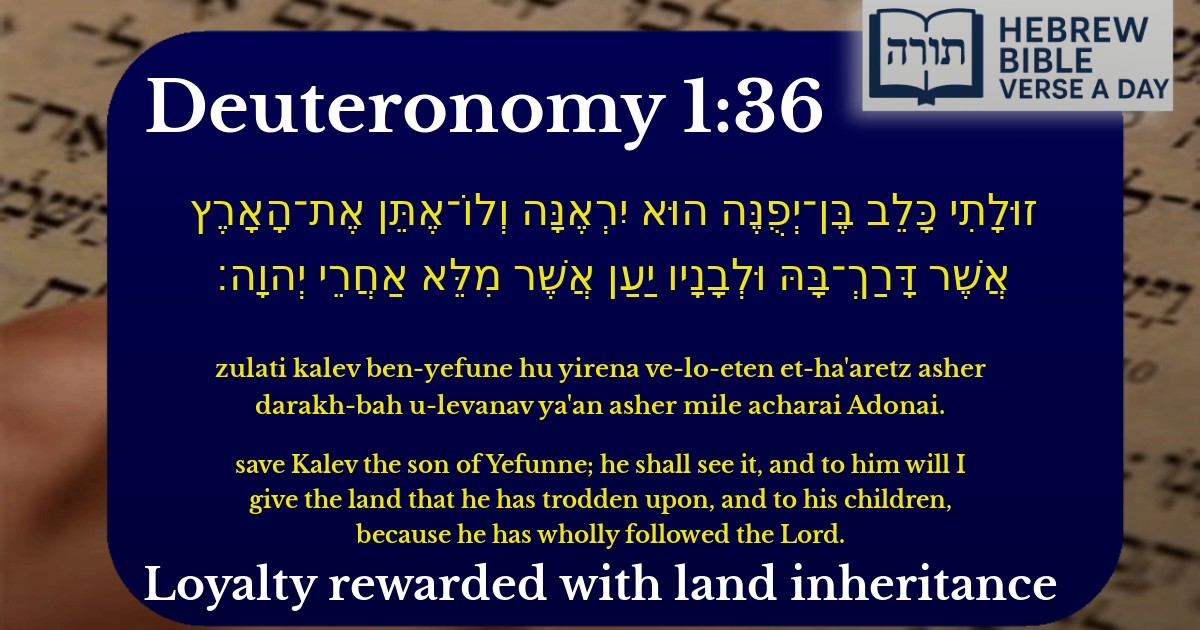Join Our Newsletter To Be Informed When New Videos Are Posted
Join the thousands of fellow Studends who rely on our videos to learn how to read the bible in Hebrew for free!
Hebrew Text
זוּלָתִי כָּלֵב בֶּן־יְפֻנֶּה הוּא יִרְאֶנָּה וְלוֹ־אֶתֵּן אֶת־הָאָרֶץ אֲשֶׁר דָּרַךְ־בָּהּ וּלְבָנָיו יַעַן אֲשֶׁר מִלֵּא אַחֲרֵי יְהוָה׃
English Translation
save Kalev the son of Yefunne; he shall see it, and to him will I give the land that he has trodden upon, and to his children, because he has wholly followed the Lord.
Transliteration
Zulati kalev ben-yefune hu yirena ve-lo-eten et-ha'aretz asher darakh-bah u-levanav ya'an asher mile acharai Adonai.
Hebrew Leining Text
זֽוּלָתִ֞י כָּלֵ֤ב בֶּן־יְפֻנֶּה֙ ה֣וּא יִרְאֶ֔נָּה וְלֽוֹ־אֶתֵּ֧ן אֶת־הָאָ֛רֶץ אֲשֶׁ֥ר דָּֽרַךְ־בָּ֖הּ וּלְבָנָ֑יו יַ֕עַן אֲשֶׁ֥ר מִלֵּ֖א אַחֲרֵ֥י יְהֹוָֽה׃
זֽוּלָתִ֞י כָּלֵ֤ב בֶּן־יְפֻנֶּה֙ ה֣וּא יִרְאֶ֔נָּה וְלֽוֹ־אֶתֵּ֧ן אֶת־הָאָ֛רֶץ אֲשֶׁ֥ר דָּֽרַךְ־בָּ֖הּ וּלְבָנָ֑יו יַ֕עַן אֲשֶׁ֥ר מִלֵּ֖א אַחֲרֵ֥י יְהֹוָֽה׃
🎵 Listen to leining
Parasha Commentary
📚 Talmud Citations
This verse is quoted in the Talmud.
📖 Sotah 34b
The verse is cited in a discussion about the merits of Kalev (Caleb) and his loyalty to God, contrasting him with the other spies who brought a negative report about the land of Israel.
📖 Sanhedrin 111b
The verse is referenced in a discussion about the righteous individuals who were granted entry into the Land of Israel, highlighting Kalev's exceptional faithfulness.


The Merit of Kalev ben Yefunne
The verse (Devarim 1:36) highlights Kalev's exceptional loyalty to Hashem during the episode of the spies. Unlike the other spies who brought back a negative report about Eretz Yisrael, Kalev remained steadfast in his faith. Rashi explains that the phrase "מִלֵּא אַחֲרֵי ה'" ("wholly followed the Lord") refers to Kalev's complete devotion, as he resisted the influence of the other spies and even went to pray at the graves of the Avot in Chevron to strengthen his resolve (Rashi on Bamidbar 14:24).
Kalev's Reward
The verse specifies that Kalev would merit to enter Eretz Yisrael and receive the portion of land he had scouted. The Talmud (Sotah 34b) elaborates that this refers specifically to Chevron, which became his inheritance (Yehoshua 14:13-14). The Rambam (Hilchot Teshuva 3:4) cites Kalev as an example of one who repents wholeheartedly, as he initially joined the spies but later corrected his path entirely.
Contrast with the Generation of the Wilderness
Legacy for His Descendants
The verse also promises that Kalev's children would inherit the land, underscoring the principle of zechut avot (merit of the fathers). The Midrash (Bamidbar Rabbah 16:1) teaches that Kalev's descendants, including Othniel ben Kenaz (a later judge of Israel), were worthy leaders because of his righteousness.
Lessons in Emunah
Kalev's story serves as a timeless lesson in maintaining faith despite external pressures. The Kli Yakar (Devarim 1:36) emphasizes that Kalev's heart was "complete" with Hashem, a model for resisting societal influences that contradict Torah values. His legacy reminds us that true devotion is rewarded both in this world and for future generations.